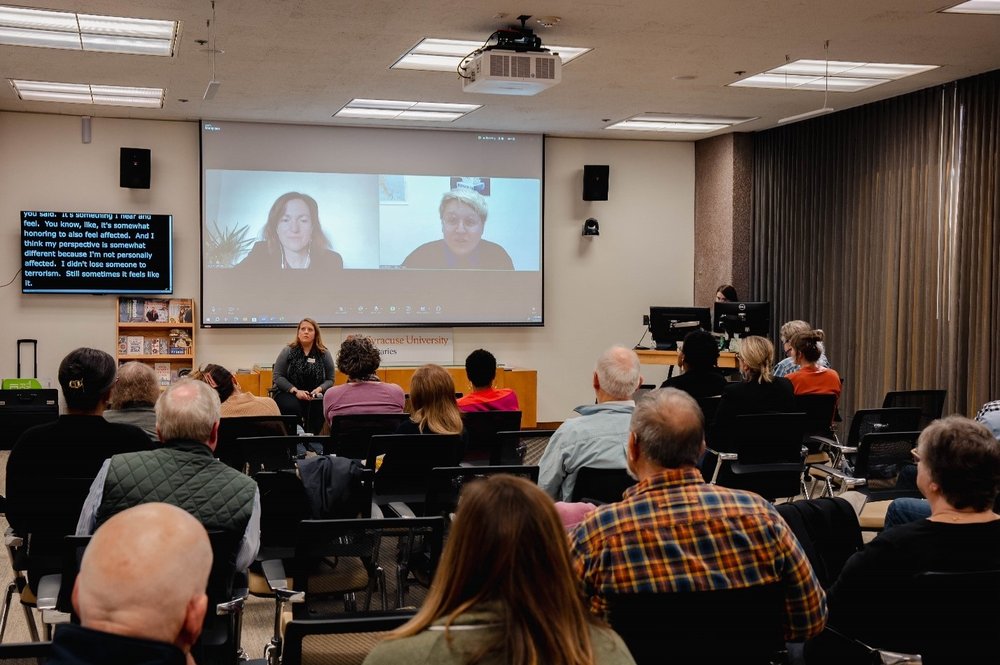In the Aftermath: Documenting and Researching Victims Support Groups

by Vanessa St.Oegger-Menn, Pan Am 103 Archivist and Assistant University Archivist
As part of Remembrance Week 2024, the Pan Am Flight 103/Lockerbie Air Disaster Archives hosted the hybrid discussion “In the Aftermath: Documenting and Researching Victims Support Groups,” which I had the privilege of moderating as Pan Am 103 Archivist & Assistant University Archivist with the Libraries’ Special Collections Research Center. Each year, the campus community here at Syracuse University comes together with the community of Lockerbie, Scotland and loved ones of the 270 victims of the December 21, 1988 bombing of Pan Am Flight 103 to commemorate the lives of those lost, to honor the work of their families and communities in pursuing justice, and to recognize our hopes for the future through the Remembrance and Lockerbie Scholars. In the words of the Scholars’ mission statement – we Look Back, and we Act Forward. As part of these annual commemorations, the Archives hosts programming ranging from pop-up exhibitions to guest speaker events highlighting the multi-faceted nature of trauma-affiliated collections.
It is the distinct privilege of the Pan Am Flight 103/Lockerbie Air Disaster Archives to serve as the most extensive repository of archival, primary source collections about the disaster and its aftermath, and the lives of those killed and directly impacted. Comprising over 500 linear feet of material, we serve as a resource for those looking to learn about the lives and legacies of individual victims; the precedents set by the international investigation in establishing protocols for response to mass-casualty incidents; the significance of the Kamp van Zeist trial on international law and victims’ services; and the ways in which the collective action of the families in advocating for justice, improved aviation security, and more robust support for victims and survivors have contributed to our understanding of the aftermath of tragedies to this day, nearly 36 years after the bombing of Pan Am 103.
Among the records that support this research are those created by organized victims groups. During “In the Aftermath,” panelists Jelena Watkins and Ezra Rudolph offered their insights on how affected communities, archivists and cultural heritage organizations, and historians and other scholars can work together in the aftermath of a crisis, disaster, or tragedy to ensure the archival record is created, preserved, and utilized in ways that accurately document the history of an event or period while acknowledging the sensitive nature of these types of records for those who create them, those who provide access to them, and those who interpret them for future generations.
Watkins, who is psychotherapist specializing in helping people affected by terrorism and other collective trauma events, serves as co-director of the Centre for Collective Trauma in the United Kingdom and a member of the Archiving Disaster Support Group Records project team. Following the loss of her brother in the September 11, 2001 attacks, Watkins became a founder-member and trustee of the September 11 UK Families Support Group. She shared her experiences working to gather and prepare this group’s records for donation to an archive where they will contribute to the permanent historical records of the tragedy and its impact on families and loved ones internationally. This experience closely parallels that of other victim groups – including the Victims of Pan Am Flight 103, Inc. – and their efforts to document and honor the work and legacy of victims, survivors, and loved ones.
Rudolph is a research associate for Contemporary and Cultural History at the University of Göttingen in Germany whose dissertation project focuses on survivors of terrorism who became activists in Europe and the United States since the 1980s. Along with their advisor, Petra Terhoeven, Rudolph serves as an expert on victims of terrorism for the German government. They shared insights from their expertise and ongoing research into the ways in which affected communities define categories such as “victim” or “survivor,” and frequently confront societal expectations over how these groups are expected to behave in the public sphere. In particular, Rudolph discussed their research into the formation, activism, and advocacy of the families and loved ones of those killed in the bombing of Pan Am Flight 103. A great deal of this research was conducted at the Pan Am Flight 103/Lockerbie Air Disaster Archives at SCRC using the Victims of Pan Am Flight 103, Inc. Collection and other collections we hold, in addition to Rudolph’s oral history interviews with many family and community members during their time as a visiting research fellow at the German Historical Institute in Washington, D.C. from Fall 2023 to Spring 2024.
Both Watkins’ and Rudolph’s presentation help to shed light on the many ways in which the creation, preservation, and interpretation of the archival record surrounding a crisis, disaster, or tragedy can help us to better connect and empathize with affected communities and contextualize significant moments and periods in our shared history.
